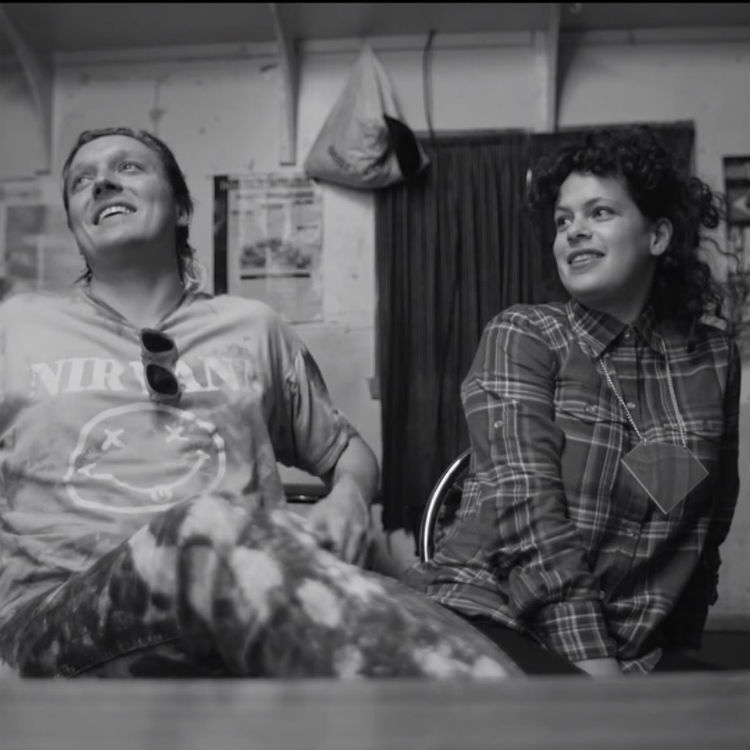
Two things you never knew about Death Cab for Cutie: 1. The Jocks love them, and 2. They really seriously love Topman. Following a day of being locked in a hotel room, singer Ben Gibbard engage in earnest discussion with guitarist Chris Walla about which trad Brit stores to hit first, dismissing H+M outright - "There's H+M in New York you know, you can get that stuff already" - then jump into the lift and head out into the drizzly Kensington day to buy enough kit to satisfy his shirt and belt desires at Topman. If Seth Cohen could see him now, he'd salute him.
And let's get the references out of the way. When Gigwise heads up to talk to Death Cab, chatting about their new album 'Plans', the floor outside is littered with abandoned crib notes from the afternoon's interviewers: every single one asks how they were affected by being propelled to fame on a certain TV show (ahem, The OC). The band delicately sidestep the issue and focus on the move to Sony. Ben fills us in: "What's happening to us isn't a new thing, an indie band that eventually kind of moves up, on paper finds a larger audience and, on paper at least, finds a larger audience. We didn't sign to a major label because we wanted to change how we did things. I think more than anything it was because we could keep on doing what we were doing and, on paper at least, reach more people doing it."
Still, being on one of the most cult shows in the world means you lose a certain amount of anonymity, what with your face being splashed all over the telly and all. "I think one of the weirdest things was Nick (Harmer, bass) and I with our girlfriends at a baseball game in the bar and there were these really sporty guys leering at us and I was like 'Oh man, we don't belong here - are they going to fight us, hit on our girlfriends, what's going to happen?'" Ben relates in his wryly laconic way. "And as soon as we got up they went 'Death Cab rocks man!'" He pauses, clearly amused by the image of a bunch of sports boys weeping along to Death Cab songs. "Yeah, those weirder scenarios happen more often now."
Death Cab for Cutie have been cultivating a loyal fanbase since they released 'Prove My Hypotheses' in 1999. It's not just Seth Cohen's fictional adolescence they've soundtracked, but thousands of disenchanted kids the world over, looking as everyone does, for an answer in music. In Death Cab's intelligent and affecting lo-fi songs, they reckon they've found it.
After the band's infamous TV performance, an indie war started with die-hard fans being quick to criticise the Johnny-come-latelies who only knew the band from 'Sound of Settling'. This isn't just a case of "my band" syndrome: Death Cab is one of the very few bands who, according to their fans, speak to them through music. "I don't really think about it too much because it gets into back patting," says Ben, dismissing the idea of being an adolescent's guru." I'm writing songs about my life and that thought's one thing that can make musicians a little more big-headed than they should be. Every emotion in your life can be tied to a song." Nick adds with a sly grin:"It's weird to think of kids having their first kiss to a Death Cab song, or that there'd be some Death Cab record involved in the achievement of a, er, certain base level."
The band's sound is characterised through understated melodies and lyrics that manage to be emo without the necessity of emotional haircuts and an angst-ridden image. Gibbard's distinctive black glasses aside, the band could easily fade into a crowd without being noticed, which goes someway to explaining why it's the music that gets the press rather than the band themselves.
 "There's a lot of musical depth in the new record, a lot of texture and smaller moments that after repeated listens make themselves known to you," says Nick. Any cynical bastard reading that on paper could be forgiven for screaming 'pretentious!' but the band speak about their music in such a matter-of-fact way that it doesn't come across like that. Death Cab are cerebral, but they have passion for what they're doing, albeit in a measured way, and it sounds perfectly natural to treat their songs in such an analytical manner. Nick continues: " Also lyrically there's a lot of introspection. This record has a very stream of consciousness feel from the beginning through the end and I really like its overall impact and the experience of listening to it for that reason.
"There's a lot of musical depth in the new record, a lot of texture and smaller moments that after repeated listens make themselves known to you," says Nick. Any cynical bastard reading that on paper could be forgiven for screaming 'pretentious!' but the band speak about their music in such a matter-of-fact way that it doesn't come across like that. Death Cab are cerebral, but they have passion for what they're doing, albeit in a measured way, and it sounds perfectly natural to treat their songs in such an analytical manner. Nick continues: " Also lyrically there's a lot of introspection. This record has a very stream of consciousness feel from the beginning through the end and I really like its overall impact and the experience of listening to it for that reason.
The Death Cab members are pretty unfazed by the god-like status they currently hold in some quarters - indeed drummer Jason McGerr is so unfazed he's actually flat out on the enormous hotel bed. "I'd rather have there be first person word of mouth praise or criticism than whatever thick glossy magazine is going to pay a guy $1000 to review a record," says Ben. "There's a power in that too," says Nick, " Fiona Apple's new record is going to come out because of a groundswell of support - her label didn't want to do anything with it."
As the digital revolution gains momentum, Death Cab have joined the growing list of bands that play their entire album out on their website, citing the internet as a crucial way of gaining musical exposure. "It's been absolutely necessary for a band like us, on a small label in the States for years," Nick explains. "The fact that people all over the world can hear about our band online is great. It's only bad when some guy breaks into your studio and takes a rough mix." Ben agrees, "That goes for everybody, like bands who haven't had huge promotional budgets to take out ads in magazines have relied on word of mouth, I know early on we certainly did."
"Things have changed a little bit in those regards now, but we use those means to interact with people who like our music and we want them to come to our website, read our journal entries and all that kind of stuff," adds Nick. "I think it adds to the musical experience." The internet allows for innovation as well as for communication. "The older I get, the more I settle into how I feel about music," Ben says. "I'm not into the idea of there being rules and I think the longer that we were on an independent label there was this thought that we were purposely living our creative lives by a set of aesthetics and rules."
He grins. Death Cab may have a fast-selling tour to return to back in the States, but for the next hour, the band's singer is taking their aesthetic values to Topman.



































